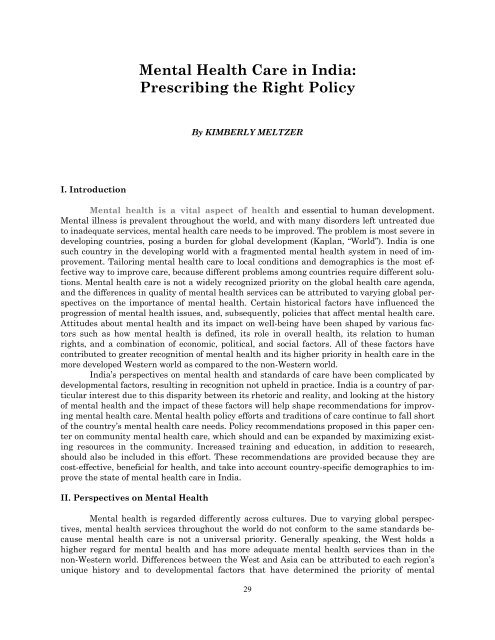Pepperdine University School of Public Policy
Pepperdine University School of Public Policy
Pepperdine University School of Public Policy
Create successful ePaper yourself
Turn your PDF publications into a flip-book with our unique Google optimized e-Paper software.
Mental Health Care in India:<br />
Prescribing the Right <strong>Policy</strong><br />
By KIMBERLY MELTZER<br />
I. Introduction<br />
Mental health is a vital aspect <strong>of</strong> health and essential to human development.<br />
Mental illness is prevalent throughout the world, and with many disorders left untreated due<br />
to inadequate services, mental health care needs to be improved. The problem is most severe in<br />
developing countries, posing a burden for global development (Kaplan, “World”). India is one<br />
such country in the developing world with a fragmented mental health system in need <strong>of</strong> improvement.<br />
Tailoring mental health care to local conditions and demographics is the most effective<br />
way to improve care, because different problems among countries require different solutions.<br />
Mental health care is not a widely recognized priority on the global health care agenda,<br />
and the differences in quality <strong>of</strong> mental health services can be attributed to varying global perspectives<br />
on the importance <strong>of</strong> mental health. Certain historical factors have influenced the<br />
progression <strong>of</strong> mental health issues, and, subsequently, policies that affect mental health care.<br />
Attitudes about mental health and its impact on well-being have been shaped by various factors<br />
such as how mental health is defined, its role in overall health, its relation to human<br />
rights, and a combination <strong>of</strong> economic, political, and social factors. All <strong>of</strong> these factors have<br />
contributed to greater recognition <strong>of</strong> mental health and its higher priority in health care in the<br />
more developed Western world as compared to the non-Western world.<br />
India’s perspectives on mental health and standards <strong>of</strong> care have been complicated by<br />
developmental factors, resulting in recognition not upheld in practice. India is a country <strong>of</strong> particular<br />
interest due to this disparity between its rhetoric and reality, and looking at the history<br />
<strong>of</strong> mental health and the impact <strong>of</strong> these factors will help shape recommendations for improving<br />
mental health care. Mental health policy efforts and traditions <strong>of</strong> care continue to fall short<br />
<strong>of</strong> the country’s mental health care needs. <strong>Policy</strong> recommendations proposed in this paper center<br />
on community mental health care, which should and can be expanded by maximizing existing<br />
resources in the community. Increased training and education, in addition to research,<br />
should also be included in this effort. These recommendations are provided because they are<br />
cost-effective, beneficial for health, and take into account country-specific demographics to improve<br />
the state <strong>of</strong> mental health care in India.<br />
II. Perspectives on Mental Health<br />
Mental health is regarded differently across cultures. Due to varying global perspectives,<br />
mental health services throughout the world do not conform to the same standards because<br />
mental health care is not a universal priority. Generally speaking, the West holds a<br />
higher regard for mental health and has more adequate mental health services than in the<br />
non-Western world. Differences between the West and Asia can be attributed to each region’s<br />
unique history and to developmental factors that have determined the priority <strong>of</strong> mental<br />
29












